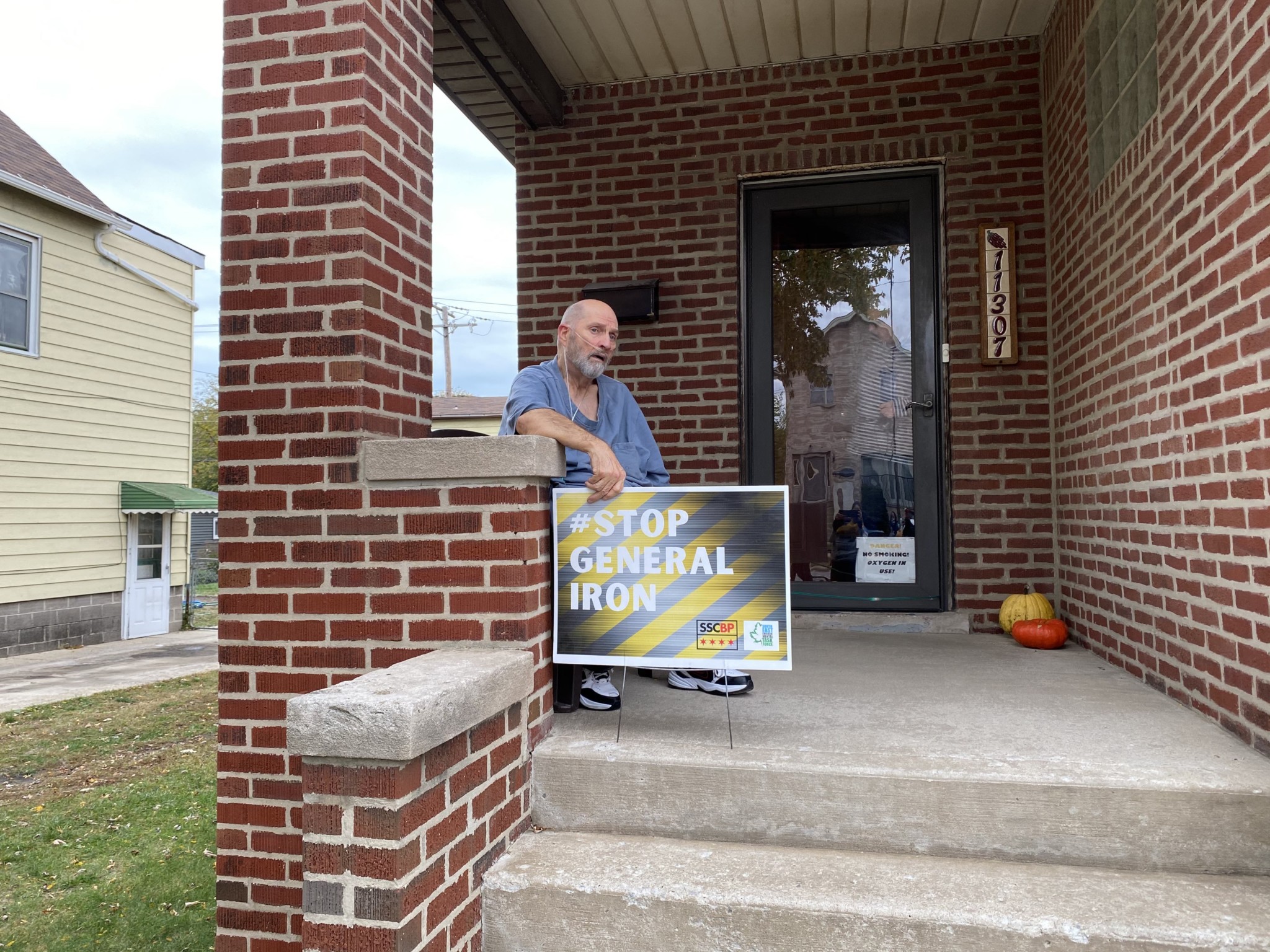The rest of Chicago seems light years away whenever I’m in Hegewisch, visiting my brother or crossing the state border while passing through to visit family in Hammond, Indiana. Living on the Southwest Side for ten years, I’ve grown accustomed to walking a few minutes to a bus stop or train station and being immediately connected to Chinatown, Bridgeport, the Loop, and other parts of the city in a matter of minutes.
Driving down Brainard Ave., in Hegewisch,you’ll pass Calumet Harbor Lumber Company—a saw mill and manufacturer. Vlado Truck Parking—a lot that is dedicated to truck parking—also operates down the avenue. Great Lakes Reloading—a steel processing company—is located nearby. Power posts and power towers stand visible as the area’s skyscrapers. The rest: rows of bungalows, small businesses on Baltimore Ave., some abandoned industrial sites, and blight.
For this project, I asked friends, family, and locals to describe the area. Their responses included the neighborhood’s industrial past; its steel mills, manufacturing, and factories; Wolf Lake’s natural areas as well as vacant land; and the police.
Even natural spaces such as Wolf Lake are surrounded by industry. The Hegewisch Marsh, which contains 129 acres of native marsh, wetland, and prairie habitats along the Calumet River, sits south of the Ford Motor Plant at Torrence Ave. and 130th St. and east of an enormous landfill. Wolf Lake’s 804 acres straddle the Indiana and Illinois state line near Lake Michigan, and have suffered years of environmental damage caused by Hegewisch’s history of heavy industries. Local environmental activist groups have worked hard to clean both Wolf Lake and the marsh. Avenue “O” takes drivers on a narrow scenic path through Wolf Lake on the left if you’re driving south.
Just as nature perseveres in Hegewisch despite the threats of polluting companies, so do its people. I met Melany Flores, who participated in the Stop General Iron hunger strike in the spring of 2021 to keep a metal-scrapping company from coming to her neighborhood. When I first spoke to Flores months back on the phone, she told me she still could not eat like she used to before the hunger strike.
I also spoke to Jesse Diaz, who opened a nutrition club in Hegewisch last year. His goal is to bring happiness in the neighborhood around the topic of nutrition and provide a welcoming space to all. He opened his business in spite of the pandemic, and in spite of being the only LGBT and brown individual on the board of the Hegewisch Business Association.
Flores told me that after the hunger strike, which came about during the pandemic and was motivated largely by the social momentum built during the past year’s movements such as Black Lives Matter, her neighborhood would not be the same. She said the pandemic revealed a lot of the ruptures in her neighborhood and beyond but she remains hopeful for change. This reminded me of what Arundhati Roy wrote in her latest essay, “The Pandemic Is a Portal”—from her forthcoming book Azadi: Freedom. Fascism. Fiction. She writes:
“Whatever it is, coronavirus has made the mighty kneel and brought the world to a halt like nothing else could. Our minds are still racing back and forth, longing for a return to ‘normality,’ trying to stitch our future to our past and refusing to acknowledge the rupture. But the rupture exists. And in the midst of this terrible despair, it offers us a chance to rethink the doomsday machine we have built for ourselves. Nothing could be worse than a return to normality. Historically, pandemics have forced humans to break with the past and imagine their world anew. This one is no different. It is a portal, a gateway between one world and the next.” (Alma Campos)
Neighborhood captain Alma Campos is the immigration editor at the Weekly.
Best Startup
Hegewisch Nutrition

Hegewisch Nutrition is a place where the music is always beating loud, new items are added to the menu and every single customer gets a big, “Hello.” “One of the main protocols that we have is that nobody enters without a big hello. And nobody leaves without a sorrowful goodbye,” said owner Jesse Diaz.
While some businesses closed temporarily and some for good during the pandemic, Diaz took a risk and in the spring of 2020 he opened his nutrition shop. Diaz said he wanted to build community around the topic of nutrition. He wanted residents in the area to have access to nutritional items which are seldom only available in other parts of the city. Residents can find various health snacks at Hegewisch Nutrition such as fruit smoothies, protein drinks, acai bowls (smoothie bowls made from fruit and acai berries), and teas.
But the establishment is more than a nutrition shop for neighbors. Diaz said it has become a community hub and social gathering space that brings people together in an upbeat and motivational environment. A quote from C.S. Lewis is painted on the wall inside the shop’s waiting area: “You can’t go back and change the beginning, but you can start where you are and change the ending.” Smiling customers of all ages take selfies or group photos behind this wall and tag the business’s Instagram account.
Diaz currently operates Hegewisch Nutrition from a pop-up window where people can stop by and order. He originally wanted to serve inside his establishment but he had to pivot due to the pandemic. “So I made the philosophy a little bit more bigger than the actual product.”
Diaz sits on the board of the Hegewisch Business Association where he is the first brown and LGBTQ member. While thirty-five percent of the neighborhood’s population is Hispanic and 60 percent is White, chamber members are mostly white males, said Diaz. “I think, you know, it was something that was needed in that area,” he said.
Among his favorite customers are Ford Factory employees who he said appreciate the healthy options available who tell him they would otherwise be drinking pop. He also appreciates older adults who walk in to buy smoothies. “They see the pride flags everywhere and it’s something different to them, but they’re accepting. We are the ones who provide the vibe and you just come into it and you become part of it. That’s been the most gratifying thing to see… that shift in people.” (Alma Campos)
Hegewisch Nutrition, 13538 S Brandon Ave. Monday–Friday, 6am–7pm; Saturday, 7am– 5pm; Sunday, 8am–2pm. instagram.com/hegewisch_nutrition_
Best Local Activist
Melany Flores
Growing up, Melany Flores, now twenty-five, said she didn’t like her community. She refers to the Hegewisch neighborhood located in the Southeast Side. At the patio of Small World Bar and Grill, located at 106th and Mackinaw, just a few minutes from Hegewisch, we were surrounded by structures and businesses such as Z Materials, a stone supplier, Cruz Brothers Tuckpointing, Cronimet Corporation, a stainless steel plant, and smokestack skyscrapers. Flores talked to the Weekly about a couple of major events that shifted her perspective.
Flores was a victim of racial discrimination. Three years ago, inside a local tavern, a bartender asked her if she had a green card. The bartender continued and asked her if her parents also had green cards. “I was extremely confused and extremely uncomfortable,” she said. But when she spoke out against the incident on social media, she was surprised at how many people in the neighborhood had experienced the same at the local establishment. “The post blew up,” Flores said. She said this experience made her see how powerful it is to speak up. And so she began to do so even more.
In the summer of 2020, Flores showed her support for Black Lives Matter openly outside her home despite her neighbors’ criticism. Flores and her daughter would sit outside their porch on many summer days, holding Black Lives Matter signs and playing music to show solidarity. While this made many of her neighbors upset, Flores said, others viewed her home as the safe space in the community. “It was very interesting to see all the different people that would actually come to my house to talk to me. And to hang out…it had become a safe haven…”, she said. She participated in marches and joined groups to support Black Lives Matter. “All the right people fell together in the right place. You could kind of really tell what side you were on.”
In the spring of 2021, Melany joined the Stop General Iron Coalition—a group of community and environmental activists fighting the relocation of a metal shredder to Hegewisch from the affluent Lincoln Park neighborhood. She had already been attending rallies and events but she felt she needed to do more. That is why she decided to take part in the hunger strike. Melany developed dangerous symptoms from not eating anything for fifteen days: fever, extreme cold body sensations, headaches, and lethargy.
Flores said that her biggest motivation is her six-year-old daughter and her community. “I want to teach her that even though she might think she has a little voice. She has a big one.” Flores grew up with a single mother who told her she can do just as much as anybody else. “And that if I ever wanted something, I needed to work for it.” (Alma Campos)
Best Community Pushback
The Fight Against General Iron

I wrote my first story for the Weekly, “Rise Against General Iron,” almost a year ago. I left my apartment that fall morning and drove on the Skyway to interview organizers on the Southeast Side at the East Side Memorial on 100th Street and Ewing Avenue.
People were setting up a table to sell t-shirts and face masks. The t-shirts read “Stop General Iron” and demonstrators painted Halloween makeup on their faces and hopped on their bikes en route to George Washington High School where they would meet students to protest the metal shredder that was slated to come to the neighborhood.
At the rally, high school students shouted they wanted justice now, as the area is already overburdened with toxic pollution. Students and advocates said they wanted answers from the city, and from the alderperson in their ward, Susan Sadlowski-Garza. The high school is a walking distance from the metal shredder. Police officers and squad cars surrounded hundreds of demonstrators and they followed the crowd when they marched to Sadlowski-Garza’s home some blocks away. Dozens of similar rallies and marches would take place that year including a thirty-day hunger strike in the spring of 2021.
In May of that year, the EPA said the plan by General Iron to operate in Hegewisch raises “significant civil rights concerns.” As a result, Mayor Lori Lightfoot said she would conduct an additional environmental analysis and indefinitely delay a final permit needed to operate on the Southeast Side. This would not have happened without the work of local residents and organizations. The coalition’s work over the last three years has also helped raise consciousness to a new generation about environmental concerns in the area though it has been decades-long work that has made this happen.
The coalition continues to fight to close down the metal shredder completely and continues addressing environmental racism in Hegewisch and surrounding neighborhoods. (Alma Campos)
Learn more about the movement and get updates here: stopgeneraliron.org




Nicely wrote we are a great community of course we can do better and I see that coming thank you for taking the time to write about this community
Thank you for writing this! One question – is Hegewisch Nutrition a front for Herbalife products? My ears perk whenever I see the combination of “nutrition” and specific products for sale. Maybe worth considering, as Herbalife is a known, predatory MLM company.